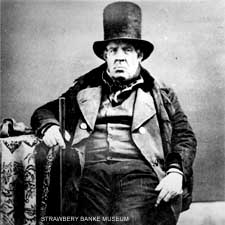|
FRESH STUFF DAILY |
|
|
||
|
|
||
|
|
||
|
SEE ALL SIGNED BOOKS by J. Dennis Robinson click here |
||
Page 1 of 3
It was the train, Aldirch contends in his final chapter, that killed the unique character of Portsmouth. What made the town special was its connection to the world by sea, that was, for a time shut off. Between then and the time the railroad arrived, a unique crop of strange people evolved. Now we’re just another average American town.
Chapter Seven: Personal Reminiscences BACK to Chapter Six The running of the first train over the Eastern Road from Boston to Portsmouth -- it took place somewhat more than forty years ago -- was attended by a serious accident. The accident occurred in the crowded station at the Portsmouth terminus, and was unobserved at the time. The catastrophe was followed, though not immediately, by death, and that also, curiously enough, was unobserved. nevertheless, this initial train, freighted with so many hopes and the Directors of the Road, ran over and killed- LOCAL CHARACTER. Up to that day Portsmouth had been a very secluded little community, and had had the courage of its seclusion. From time to time it had calmly produced an individual built on plans and specifications of its own, without regard to the prejudices and conventionalities of outlying districts. This individual was purely indigenous. He was born in the town, he lived to a good old age in the town, and never went out of the place, until he was finally laid under it. To him, Boston, though only fifty-six miles away, was virtually an unknown quantity-only fifty-six miles by brutal geographical measurement, but thousands of miles distant in effect. In those days, in order to reach Boston you were obliged to take a great yellow, clumsy stage-coach, resembling a three-story mud-turtle -- if the zoologist will, for the sake of the simile, tolerate so daring an invention; you were obliged to take it very early in the morning, you dined at noon at Ipswich, and clattered into the great city with the golden dome just as the twilight was falling, provided always the coach had not shed a wheel by the roadside or one of the leaders had not gone lame. To many worthy and well-to-do persons in Portsmouth, this journey was an event which occurred only twice or thrice during life. To the typical individual with whom I am for the moment dealing, it never occurred at all. The town was his entire world; he was as parochial as a Parisian; Market Street was his Boulevard des Italiens, and the North End his Bois de Boulogne. Of course there were varieties of local characters without his limitations: venerable merchants retired from the East India trade; elderly gentlewomen, with family jewels and personal peculiarities; one or two scholarly recluses in by-gone cut of coat, haunting the Athenaeum reading-room; ex sea captains, with rings on their fingers, like Simon Danz's visitors in Longfellow's poem -- men who had played busy parts in the bustling world, and had drifted back to Old Strawberry Bank in the tranquil sunset of their careers. I may say, in passing, that these ancient mariners, after battling with terrific hurricanes and typhoons on every known sea, not infrequently drowned themselves in pleasant weather in small sail-boats on the Piscataqua River. Old sea-dogs who had commanded ships of four or five hundred tons had naturally slight respect for the potentialities of sail-boats twelve feet long. But there was to be no further increase of these odd sticks -- if I may call them so, in no irreverent mood-after those innocent-looking parallel bars indissolubly linked Portsmouth with the capital of the Commonwealth of Massachusetts. All the conditions were to be changed, the old angles to be pared off, new horizons to be regarded. The individual, as an eccentric individual, was to undergo great modifications. If he were not to become extinct -- a thing little likely -- he was at least to lose his prominence. However, as I have said, local character, in the sense in which the term is here used, was not instantly killed, it died a lingering death, and passed away so peacefully and silently as not to attract general, or perhaps any, notice. This period of gradual dissolution fell during my boyhood. The last of the cocked hats had gone out, and the rail way had come in, long before my time; but certain bits of color, certain half obsolete customs and scraps of the past, were still left over. I was not too late, for example, to catch the last town crier -- one Nicholas Newman, whom I used to contemplate with awe, and now recall with a sort of affection. Continue OLD TOWN BY THE SEA
Please visit these SeacoastNH.com ad partners.
News about Portsmouth from Fosters.com |
| Friday, April 26, 2024 |


|
Copyright ® 1996-2020 SeacoastNH.com. All rights reserved. Privacy Statement
Site maintained by ad-cetera graphics

 Link Free or Die
Link Free or Die



 PERSONAL REMINISCENCES
PERSONAL REMINISCENCES














